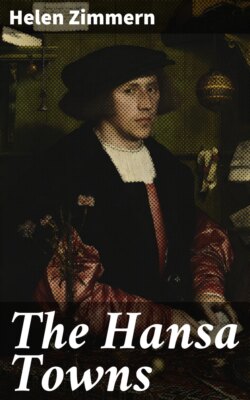Читать книгу The Hansa Towns - Helen Zimmern - Страница 14
На сайте Литреса книга снята с продажи.
LÜBECK RECEIVES AN IMPERIAL VISITOR.
ОглавлениеTable of Contents
The great war ended, the Hansa, in true merchant spirit, instantly busied itself making up its accounts. The poundage toll, instituted to cover martial expenses, was at once abolished; credit and debit carefully balanced. Examination of its books showed that, notwithstanding the long duration of the war, the Hansa had been as little a pecuniary, as it had been a military, loser, in its struggle against Waldemar's assumptions.
While thus engaged, Lübeck was startled by the intelligence that the Emperor, Charles IV., intended to honour "his beloved free Imperial City of Lübeck" by a personal visit. Since Frederick Barbarossa no emperor had ever passed the city gates, and the town councillors were probably not far wrong when they perceived in this proposal a tacit imperial acknowledgment of the Hansa's great military victories, victories in which Lübeck had played the part of leader. For twenty-eight years Charles had worn the imperial crown, and all that time his chief efforts had been directed towards extending the power of his family, and the home influence of the emperors. He was a shrewd and wily old man, who saw the dangers Italy presented to the empire, and wished to avoid them. At first, however, he had no proper comprehension of the great power that had sprung up within his own domains in the shape of the Hanseatic League, nay, indeed, he had sided against his subjects and with Waldemar. But now the scales fell from his eyes, and he appreciated, as all Europe did, the greatness and the strength of the Hansa.
Of course he did not admit this in words, yet there is little doubt that he wished to gain the goodwill of this League, and hoped thus to get from it both pecuniary and military support for his dynastic plans.
It was, however, "diamond cut diamond;" the worthy councillors of Lübeck were no less shrewd and wily than their imperial master. Needless to say that, in accordance with the usage of the age, they indulged in the most servile and hyperbolical expressions of their joy and unworthiness to be so honoured, but like true merchants they had a good memory, and knew that Charles had not so long ago pawned his coronation cloak and some of his tolls to one of their federation, and they suspected in their heart of hearts that ulterior motives were probably not absent to account for this unwonted event. Still, with the wisdom of the serpent, they let nothing of this appear, either in their replies to Charles, or in their treatment of him. Like their Lombard predecessors, even when in open warfare against the emperor's authority, they ever protested in words their submission and fidelity to the imperial crown.
It was in the autumn of 1375 that Charles the Fourth entered the gates of Lübeck as the city's guest. It is a curious fact that his visit coincided with the death of Waldemar on the island of Zealand; but in those days of slow communication the news did not reach the emperor till after the festivities were over.
On October 22nd, the Emperor, accompanied by the Empress, the Archbishop of Cologne, prince-bishops, dukes, earls, and suzerains many and mighty, halted before the closed gates of Lübeck. His suite, his armed retainers, and those of his party, made such a numerous host that Lübeck hesitated awhile ere opening its gates to so great a multitude, not feeling wholly sure whether their mission were indeed one of peace, or whether an affectation of peace was meant to cover a deceitful attack. For such things were not uncommon in those days.
After some preliminaries it was however decided to let them all in. A halt had been made outside the walls. Here was situated the Chapel of St. Gertrude, patron saint of strangers. The chapel was the property of the municipal council, and to obtain relics for it the town had spent many sums of money. Among other matters, they boasted of possessing some bones of Thomas à Becket, and it is curious to note that they sent over to England to buy these at the very time Chaucer was superintendent of tolls in the harbour of London, and was writing his immortal "Canterbury Tales," in which he derides the frauds constantly practised upon the purchasers of such wares; as in his "Pardonere's Tale." Now Charles IV. had a great fancy for objects of this nature; he was in the habit of making tours in his kingdom in order to collect them, begging them from churches or monasteries, and giving in return privileges and sanctions. It is possible he also had an eye to St. Thomas's bones, but among the rich booty he took with him from Lübeck, we find no mention of such relics.
